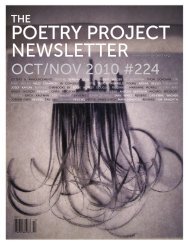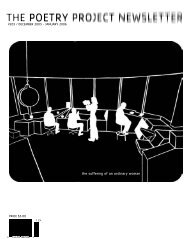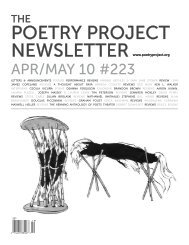Download PDF - The Poetry Project
Download PDF - The Poetry Project
Download PDF - The Poetry Project
Create successful ePaper yourself
Turn your PDF publications into a flip-book with our unique Google optimized e-Paper software.
THE POETRY PROJECT NEWSLETTER<br />
27<br />
BOOK REVIEWS<br />
mental work. <strong>The</strong> loose mind, a poet’s best asset,<br />
and a fine net of observation helped create this<br />
intensely researched opus magnum. Green-<br />
Wood is a compendium of lists growing within a<br />
larger catalog. Each section begins with a small<br />
inventory of grave offerings discovered on each<br />
walk:<br />
heart pillow wrapped in a plastic grocery bag<br />
smiling cop with one arm broken off<br />
Hello Kitty sticker that says smartfit<br />
knock-kneed mummy with green teeth<br />
Puerto Rican flag fuzzy dice<br />
wrestling dalmation puppies figurine<br />
MERRY CHRISTMAS IN HEAVEN ribbon<br />
Cobb ventured for years throughout this everchanging<br />
Necropolis glade and on one walk,<br />
she notes how the Beech trees’ smooth bark<br />
has invited generations of graffiti-carved signatures.<br />
She finds one beech dying and stands<br />
under its canopy.<br />
<strong>The</strong> leaves of the purple beech look glossy, almost<br />
black, from a distance, but underneath they<br />
cast a cool green shadow. I circle the trunk of<br />
one and find a gash that splits the tree almost in<br />
half. Inside a pale fungus has grown in layers<br />
like lace. <strong>The</strong> trunk looks black and dead as if<br />
charred by a fire. <strong>The</strong> fungus, strangely beautiful,<br />
feels moist and airy in my fingers.<br />
hot and total ruin I sign my name here<br />
Impermanence and reverence signed in a fungus;<br />
a tree’s immanent ruin, and rebirth. Through<br />
Cobb’s journey we witness both a disrupted<br />
landscape, and the vibrant hope found in decay—much<br />
like Emerson’s impulse to open the<br />
tomb of his dead young bride. A thread that<br />
runs through this book’s complex fabric is one<br />
of environmental degradation and land ownership.<br />
<strong>The</strong> simultaneous story of a landscape’s<br />
natural history and the history of patriarchal imperialism.<br />
In England, promoters of enclosure argued<br />
against plantings as fence hedges like medlar,<br />
which produce an edible fruit. <strong>The</strong> fence itself<br />
might provide the commoners with a means of<br />
sustenance.<br />
Quince<br />
Grape Holly<br />
Honeysuckle<br />
Pear<br />
Chokecherry<br />
Dogwood<br />
Bridal-wreath Spirea<br />
not flowers but bone, worn by stress and use<br />
As native tribes were relegated to squatters<br />
and the invader’s bones needed a place to rest;<br />
Green-Wood was designed to make a more<br />
“perfect,” sanitized version of the woodland.<br />
Ultimately, the mock copse became a refuge<br />
for the crushed spirits of postmodern urbanites<br />
starved for green.<br />
New Yorkers at first refused to bury their dead in<br />
Green-Wood, which they considered wild land,<br />
unprotected. <strong>The</strong>y clung to the charnel-house<br />
and churchyard wrote Cleveland. So the trustees<br />
erected an obelisk over an empty grave as a<br />
sort of decoy.<br />
From the Dutch for “cage”—it referred to the<br />
practice of capturing water birds by surrounding<br />
a pond with nets.<br />
Cobb’s verse, which interrupts and amends<br />
the prose, comes from a verdantly steeped<br />
perception which reaches past the poetry of<br />
flat identity, feminism in quotes or linear allcaps<br />
poetry-politics. Cobb’s observations are<br />
at once deeply funny and tragic. One such<br />
example is her mention of nineteenth-century<br />
“botany” books created for women (with the<br />
sexual reproduction of plants removed so that demure<br />
women would never know the rampant<br />
polyandry of the botanical world). She digs into<br />
the sediment and fertile darkness, understanding<br />
that this zig-zagging course cohabits both the<br />
past and present.<br />
Cobb’s frequent reference to R.W. Emerson’s<br />
conflicted and inspired life parallels the flood<br />
of associations from Cobb’s “mind on fire” at<br />
once bringing us within her train of thought and<br />
outward. We are peripherally shifted to the fata<br />
morgana–hazed horizon and to our endemic<br />
American dream. Happily ever after, exit stage<br />
right into the pollution sunset…the end. But the<br />
story is never that simple. Cobb’s poetry captures<br />
the unexpected symmetry of pesticide,<br />
infertility, chemotherapy, and survival in the<br />
margins. This book could only have come from<br />
the mind of a poet who manifests more than<br />
just poetry in her life. An environmental warrior<br />
as her chosen profession, Cobb’s dedication is<br />
fully realized mindfulness and awareness; her<br />
poetry understands the vast tragedy unfolding<br />
without ever relinquishing the fight. (In Tibetan,<br />
this magical quality of existence, or natural wisdom,<br />
is called drala. Dra means “enemy” or<br />
“opponent” and la means “above.” So drala<br />
literally means “above the enemy,” “beyond the<br />
enemy.”)<br />
Cobb spent six years walking under the gothic<br />
entrance to Green-Wood (whose human hand’s<br />
baroque craft has been outshined for years now<br />
by the intricately woven nests of wild Monk Parrots<br />
in the stone lattice). Cobb has entered into a<br />
world inhabited by the ghosts of a nineteenthcentury<br />
empire. Past the markers of individual<br />
time-place holders, born–died, mother–daughter,<br />
into the undisturbed flow from the mind and<br />
oneness. Green-Wood’s poetry exists in both<br />
the primordial teeming forest and currently<br />
manicured tomb. We linger where landscape<br />
designers planned a pre-Eve Eden and Cobb’s<br />
poetry invades the beastie nests of the past,<br />
which still pulse with life of cormorant phantoms<br />
and overlapping shadows she’s mapped<br />
out into the future.<br />
Every fact is a new<br />
word, a god<br />
of mercurial mind<br />
Tracey McTague serves as the editor-consigliore<br />
for Lungfull! magazine, while her book exploring dog<br />
evolution is forthcoming from Overlook Press.<br />
AERODROME ORION &<br />
Starry Messenger<br />
Susan Gevirtz<br />
(Kelsey Street Press, 2010)<br />
review by stephen motika<br />
In the realm of the skies, whether the heavens<br />
or the nearest parts of Earth’s atmosphere, the<br />
historic precedents are great and the terms of<br />
description vast. <strong>The</strong> realm might seem impossible<br />
to capture in book form, so it’s all the rarer<br />
to find Susan Gevirtz’s new volume comprised<br />
of two long poems, “AERODROME ORION” and<br />
“Starry Messenger,” wrestling with the upper<br />
reaches. Her text sprawls across large pages<br />
and weaves through a variety of registers and<br />
lexicons, from that of science, technology, and<br />
economy to the near dream states of fairytale,<br />
myth, song, and art. <strong>The</strong>se poems explore,<br />
nimbly and with subtle brevity, the unfathomable<br />
air above.<br />
Towards the end of the first poem, Gevirtz writes,<br />
“Names in our nomenclature / for new species<br />
of exhaustion,” a comment on the vastness<br />
of the vocabulary included here, from ancient<br />
Greek words to the latest acronyms. Gevirtz inserts<br />
a wide range of found language in her text,<br />
sampling Simonides and Galileo, Sor Juana and<br />
Sri Aurobindo, and snippets of air-traffic-control<br />
transcripts and comments from an airplane pilot<br />
and Salon.com travel columnist. Her sophisticated<br />
poetics and curiosity propel her project<br />
far from the realms of facts and figures into a
















